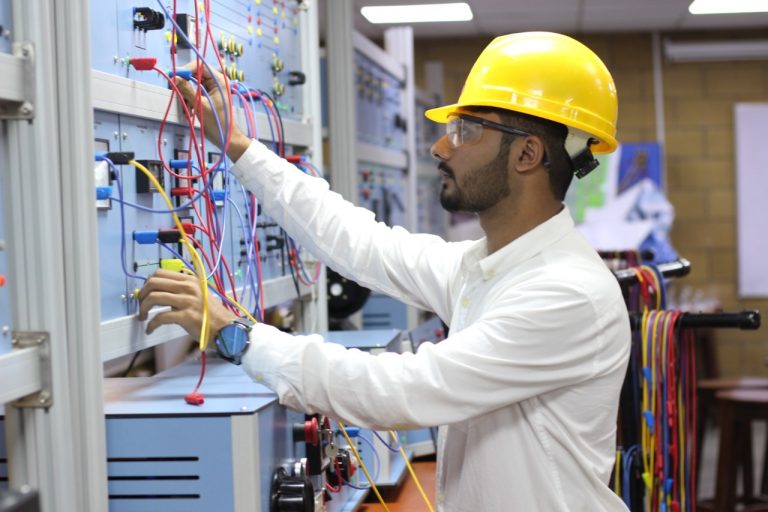Bachelor of Engineering Technology (Electronic)
- Home
- Undergraduate Programs
- Bachelor of Engineering Technology (Electronic)
Bachelor of Engineering Technology (Electronic)
Bachelor of Engineering Technology Programs

Department’s Vision
The department of Engineering Technology fosters innovation and skills to produce top-notch professionals and entrepreneurs who can compete globally and drive positive change in quality of life.
- Overview
- Admission Eligibility
- Courses
- Mission, PEO’s and PLO’s
Overview
Bachelor of Engineering Technology (Electronics) program will prepare professional technologists, i.e., skilled specialists trained to work in electronic engineering technology. This is as envisioned by National Technology Council (http://www.ntc-hec.org.pk/index.php) – the relevant accreditation body for engineering technology programs. As per NTC guidelines, the program curriculum incorporates an OBE (outcome-based education) model that is in compliance with the Sydney Accord.
Degree Requirements
- Duration of Program: 4 Years
- Number of Semesters: 8
- Total Credit Hours: 132
- Total Number of Courses: 40 + Project + Field Training
Fee Structure
- One Time Fee*: 25,000
- Security Deposit: 15,000
- Tuition Fee: 48,000
- Semester Fee*: 10,000
- Total Fee: 98,000
* One time fee includes Admission, Enrollment, and Documents Verification Fees
* Semester Fee includes Examination, Semester, and Co-curricular Charges
Passed either Higher Secondary Examination (HSC) in Pre-Engineering from any authorized board of intermediate education in Pakistan OR any equivalent foreign examination board with at least 60% or 660 marks OR is awaiting his/her final result.
First Semester
| Course No. | Course Title | Credit Hours | Knowledge Area |
|---|---|---|---|
| EET111 | Workshop Practice | 0+1 | Foundation-I |
| EET112 | Linear Circuit Analysis | 2+1 | Foundation-II |
| CET111 | Information and Communication Technologies | 1+1 | Computing-I |
| NST111 | Applied Physics | 2+1 | Natural Sciences-I |
| NST112 | Calculus and Analytical Geometry | 3+0 | Natural Sciences-II |
| HST111 / HST112 | Islamic Studies / Ethics | 2+0 | Humanities-I |
Second Semester
| Course No. | Course Title | Credit Hours | Knowledge Area |
|---|---|---|---|
| EET121 | Digital Logic Design | 2+1 | Foundation – III |
| EET122 | Solid State Electronics | 2+0 | Foundation – IV |
| CET121 | Computer Programming | 2+2 | Computing – II |
| NST121 | Linear Algebra | 2+0 | Natural Sciences – III |
| HST121 | Social Science Elective – I | 3+0 | Social Sciences – I |
| HST122 | Pakistan Studies | 3+0 | Humanities – II |
Third Semester
| Course No. | Course Title | Credit Hours | Knowledge Area |
|---|---|---|---|
| CET211 | Technical Drawing | 0+1 | Computing – III |
| EET211 | Electronic Devices and Circuits | 2+1 | Foundation – V |
| EET212 | Instrumentation and Measurement | 2+1 | Breadth – I |
| EET213 | Electrical Network Analysis | 2+1 | Foundation – VI |
| EIT211 | IDTE – I | 2+1 | IDTE – I |
| HST211 | Communication Skills | 3+0 | Humanities – III |
| NST121 | Differential Equations | 2+0 | Natural Sciences – IV |
Fourth Semester
| Course No. | Course Title | Credit Hours | Knowledge Area |
|---|---|---|---|
| EET221 | Communication Systems | 2+1 | Breadth – II |
| EET222 | Control Systems | 2+1 | Breadth – III |
| EET223 | Amplifier and Oscillators | 2+1 | Breadth – IV |
| CET222 | Microprocessors and Microcontrollers | 2+1 | Breadth – V |
| MST221 | Management Science Elective – I | 3+0 | Management Sciences – I |
| HST221 | Technical Report Writing | 3+0 | Humanities – IV |
Fifth Semester
| Course No. | Course Title | Credit Hours | Knowledge Area |
|---|---|---|---|
| EET311 | Signals and Systems | 3+1 | Foundation – VI |
| EET312 | VLSI Technology | 2+1 | Depth – I |
| EET313 | Electronics Troubleshooting and Testing | 0+2 | Depth – IIh |
| EET314 | Industrial Electronics | 2+1 | Depth – III |
| EET315 | Depth Elective – I | 2+1 | Depth – IV |
| NST311 | Numerical Analysis | 3+1 | Natural Sciences – V |
Sixth Semester
| Course No. | Course Title | Credit Hours | Knowledge Area |
|---|---|---|---|
| EET321 | Industrial Automation | 1+1 | Depth – V |
| EET322 | Depth Elective – II | 2+0 | Depth – VI |
| EET323 | Power Electronics | 2+1 | Breadth – VI |
| EET320 | Project – I | 0+3 | Senior Design Project |
| HST321 | Social Science Elective – II | 3+0 | Social Sciences – II |
| MST321 | Management Science Elective – II | 3+0 | Management Science – II |
Seventh Semester
| Course No. | Course Title | Credit Hours | Knowledge Area |
|---|---|---|---|
| EET411 | Depth Elective-III | 1+0 | Depth – VII |
| EET412 | Depth Elective-IV | 2+1 | Depth – VIII |
| EET413 | Depth Elective-V | 2+1 | Depth – IX |
| EIT411 | IDTE-II | 2+1 | IDTE – II |
| EET410 | Project – II | 0+3 | Senior Design Project |
| MST411 | Management Sciences Elective-III | 3+0 | Management Sciences – III |
Eighth Semester
| Course No. | Course Title | Credit Hours |
|---|---|---|
| CT421 | 16 Weeks Supervised Industrial / Field Training (8×5=40Hrs / Week) | 0+16 |
Program Mission
Provide the ambience to become industry ready Professionals and Entrepreneurs by offering curriculum based on cutting edge technology and experiential learning.
Program Educational Objectives
The Engineering Technology department trains graduates to be successful engineering technologists who use their knowledge and skills to develop innovative solutions for industry, government, academia, and society.
The main objectives that our graduates are expected to achieve in the long run are:
Will have demonstrated knowledge of relevant Engineering Technology appropriate for career pursuits and workplace needs.
Will have the ability to understand, diagnose, communicate and provide solutions to technical problems/situations for the benefit of the society.
Will demonstrate the intellectual curiosity to actively pursue the acquisition of new knowledge and skills necessary to refine and improve his/her abilities to contribute to the Technology domain.
Ethical commitment that allows them to deal successfully with social, technical and professional situations in their lives and work.
Program Learning Outcomes
Engineering Technology Knowledge (SA1): An ability to apply knowledge of mathematics, natural science, Engineering Technology fundamentals, and Engineering Technology specialization to defined and applied Engineering Technology procedures, processes, systems, or methodologies.
Problem Analysis (SA2): An ability to Identify, formulate, research literature, and analyze broadly defined Engineering Technology problems reaching substantiated conclusions using analytical tools appropriate to the discipline or area of specialization.
Design/Development of Solutions (SA3): An ability to design solutions for broadly- defined Engineering Technology problems and contribute to the design of systems, components or processes to meet specified needs with appropriate consideration for public health and safety, cultural, societal, and environmental considerations.
Investigation (SA4): An ability to conduct investigations of broadly-defined problems; locate, search and select relevant data from codes, databases, and literature; and design and conduct experiments to provide valid conclusions.
Modern Tool Usage (SA5): An ability to Select and apply appropriate techniques, resources, and modern technology and IT tools, including prediction and modeling, to broadly-defined Engineering Technology problems, with an understanding of the limitations.
The Engineering Technologist and Society (SA6): An ability to demonstrate understanding of the societal, health, safety, legal and cultural issues and the consequent responsibilities relevant to Engineering Technology practice and solutions to broadly defined Engineering Technology problems.
Environment and Sustainability (SA7): An ability to understand and evaluate the sustainability and impact of Engineering Technology work in the solution of broadly defined Engineering Technology problems in societal and environmental contexts.
Ethics (SA8): Understand and commit to professional ethics and responsibilities, and norms of Engineering Technology practice.
Individual and Team Work (SA9): An ability to Function effectively as an individual and as a member or leader in diverse teams.
Communication (SA10): An ability to communicate effectively on broadly defined Engineering Technology activities with the Engineering Technologist community and with society at large by being able to comprehend and write effective reports and design documentation, make effective presentations, and give and receive clear instructions.
Project Management (SA11): An ability to demonstrate knowledge and understanding of Engineering Technology management principles and apply these to one’s work as a member or leader in a team and to manage projects in multidisciplinary environments.
Lifelong Learning (SA12): An ability to recognize the need for and have the ability to engage in independent and lifelong learning in specialist Engineering Technologies.
